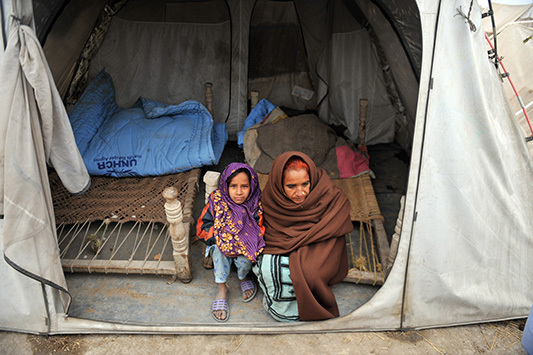By: Aref Dostyar and Ray Offenheiser
In December, Afghanistan’s Taliban regime ordered all non-governmental groups to suspend employing women, allegedly because some female employees didn’t wear the Islamic headscarf correctly. This “gender apartheid” also devastates Afghan hunger and health.
Winter in the mountainous regions of Afghanistan is harsh in the best of times, and hunger haunts communities across Afghanistan despite the best efforts of the World Food Program and other international aid organizations.
Family and friends on the ground tell me that in the first week of January, at least 100 people and 1,000 cattle froze to death. There is a real risk of human catastrophe, as 28.3 million people (two-thirds of the population) need assistance to survive.

This doesn’t have to be the case. Supplies are flowing into the country, but they need to get to those that need them the most. Under the Taliban in the early 2000s, the World Food Program working with NGOs, created a system of regional warehouses with inventory regularly stocked and distributed. It wasn’t perfect, but it mostly worked. With the ban, however, nearly 150 NGOs and aid organizations have halted operations or decreased their work significantly. It is a moral travesty.
In hopes of averting a catastrophe, Deputy Secretary-General Amina Mohammed, the most senior female United Nations official, recently visited Afghanistan. Yet despite the situation’s urgency, the governor of Kandahar—the largest city in southern Afghanistan—refused her visit, sending his deputy instead.
And Under-Secretary-General for Humanitarian Affairs and Emergency Relief Coordinator Martin Griffiths was in Kabul for days with no breakthrough to reverse the ban. To make matters worse, there are rumors that another decree to ban women from working at the UN has been drafted and awaits approval from Afghanistan’s Ministry of Foreign Affairs.
NGOs and aid agencies are in a double bind, forced by the Taliban to violate their principles regardless of what course of action they choose. If they continue their work without female staff, they will discriminate against women—and their impact will be minimized due to the reduction in essential staff. But the toll of taking a principled stance is unthinkable. Millions will die if humanitarian organizations cease assistance, and the Taliban will likely continue to cause disruption.
NGOs and aid agencies are forced to make tough choices. Fortunately, some chose to carry on during these brutal winter months. Elders have told me that Community Development Councils also continue, and they have female members. While the CDCs are no substitute for NGO staff, local leaders respect and defend these community-based institutions, which play an essential role.
The actual cause of the staggering catastrophes faced by Afghans today is not the Taliban’s decrees banning women from work and education. It’s the Taliban itself and the world’s indifference. So long as the Taliban hold exclusive power and the world casts a blind eye, life will continue to be miserable for most of its 40 million inhabitants.
The international community should not remain captive to the Taliban’s actions and only react piecemeal. If they wish to be effective, UN member states should take a united stand against restrictive policies.
The United States, along with European and Central Asian countries, should provide vital support to the UN Assistance Mission in Afghanistan. Confronting an Afghanistan run by a rebel regime requires united global leadership. The UN should take a decisive leading role in addressing the catastrophe’s root cause by implementing its own mandate.
The upcoming debate in March to extend the UN’s mission there provides an opportunity to prioritize the need for a legitimate, broad-based, responsible, and representative government.
Afghanistan needs to move beyond the mass instability and chaotic and inconsistent policymaking. Finding a path toward responsible governance and minimal stability will require the international community to make tough decisions and resolve to address the source of this national catastrophe.
***
Aref Dostyar is the former Consul General of Afghanistan in Los Angeles and a current Senior Advisor and Visiting Fellow at the University of Notre Dame’s Kroc Institute and Pulte Institute, respectively.
Ray Offenheiser is the Inaugural Director of the Pulte Institute.